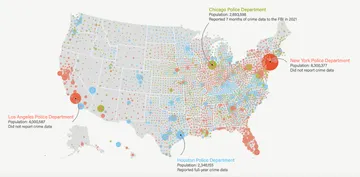This is The Marshall Project’s Closing Argument newsletter, a weekly deep dive into a key criminal justice issue. Want this delivered to your inbox? Subscribe to future newsletters here.
Across the country, crime is on voters’ minds, which means it’s on politicians’ tongues, too.
Nowhere is that better on display than in Chicago, where incumbent Mayor Lori Lightfoot failed to qualify for a runoff election in the city’s Democratic primary on Tuesday, a battle that was framed almost exclusively on the question of crime. In a poll last month, 44% of Chicago voters said crime and public safety were the most important issues in their vote for mayor, followed by criminal justice reform at 13%. Nearly two-thirds of those polled said they personally felt unsafe in the city.
A brief aside on crime rates and fears about crime: As we covered in a newsletter right before the 2022 midterms, public perceptions of crime don’t always match the reality, and the question of whether crime is “up” or “down” at any given point is a complicated one. It largely hinges on three key variables: What do we mean by “crime,” over what time period, and where it’s happening. In Chicago, homicide rates were down in 2022 compared with the two years prior, but among the highest since the 1990s, according to the local PBS station.
Paul Vallas, who won the plurality of primary voters with 34%, ran a “tough-on-crime” campaign, promising increased police patrols and the introduction of a “robust public nuisance ordinance,” reminiscent of the “broken windows” policing strategies of the past. The former head of Chicago Public Schools, Vallas has the support of the city’s powerful police union. His rise is somewhat reminiscent of New York Mayor Eric Adams in 2021, but the primary results are not a simple story of the criminal justice pendulum swinging to the right. Brandon Johnson, also headed to the runoff, secured 20% of the vote while running to Lightfoot’s left on criminal justice — promising to strengthen police accountability, end no-knock warrants, pay reparations to survivors of police torture, and erase the city’s gang database. A former public school teacher, Johnson beat Lightfoot even as her campaign sought to paint him as a “radical” seeking to “wreck our city with dangerous defunding of police.”
In defeat, Lightfoot virtually swept the city’s majority-Black neighborhoods on the south and west sides, where homicides are most concentrated — but overall turnout was also lowest in these communities. Brookings Institution fellow William Galston wrote that it’s possible that crime, inflation and the pandemic have diminished voters' belief that “politics is the most effective way of improving their circumstances.”
The mayoral primary wasn’t the only bit of criminal justice policy on the ballot, either, as Chicagoans also elected 66 members of a new police oversight council this week. A slate of 12 progressives — whom the city police union tried to have disqualified — all won their races.
The Chicago runoff will not be the only election this spring to revolve largely around issues of crime and public safety. In Denver, 12 of the 17 mayoral candidates have used the word “safe” in their campaign slogans or named safety as a key issue in their platforms, according to The Denver Post. That emphasis on safety is driving a wide range of policy proposals from candidates. Some are emphasizing approaches favored by progressives, like addressing the root causes of crime and expanding the city’s new mental health response team. Others are boosting conservative policy preferences of increasing police hires and funding, and some are pitching more of a “both… and” approach.
That’s also the case in Seattle, where in a recent “state of the city” speech, Mayor Bruce Harrell named crime as a top priority. Harrell touted an aggressive push to hire more officers, alongside plans for a new public safety department geared toward a non-police response to emergencies. Harrell has promised a “holistic approach” to crime, but one that will put making arrests first, and providing social services second, according to The Seattle Times.
In Akron, Ohio, where a mayoral primary is coming in May, nearly 90% of likely voters responding to a recent poll said they prioritize issues of “safety and crime.” Police reform and “racial justice and equality” were also top priorities, cited by 71% and 62% of respondents, respectively.
Meanwhile, this April, Wisconsin voters will decide on a proposed amendment to the state constitution that would make it more difficult for people accused of violent crimes to be released on bail. Currently, judges can only consider a person’s likelihood of returning for trial when setting bail amounts. But under the new law, judges could consider “a suspect’s criminal history and the risk the person would cause ‘serious harm’ to members of the community.”
If it passes, Wisconsin would follow in the footsteps of Ohio, where last year, voters approved a similar effort to expand what judges must consider when setting bail amounts.
